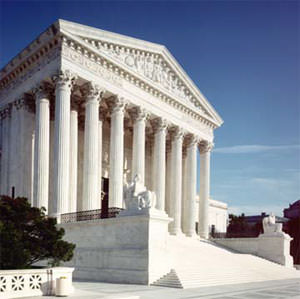SCOTUS Deals Big Blow to Campaign Finance Reform
On Thursday, Chief Justice John Roberts explained the U.S. Supreme Court's campaign finance ruling, which eliminated restrictions on corporate funding for political candidates and causes, by basing it on the First Amendment, stating that the American government doesn't have the right to "prohibit political speech, even if the speaker is a corporation or union." (continued)
On Thursday, Chief Justice John Roberts explained the U.S. Supreme Court’s campaign finance ruling, which eliminated restrictions on corporate funding for political candidates and causes by basing it on the First Amendment, stating that the American government doesn’t have the right to “prohibit political speech, even if the speaker is a corporation or union.”
Justice John Paul Stevens shot back in his 90-page dissent, “While American democracy is imperfect, few outside the majority of this court would have thought its flaws included a dearth of corporate money in politics.”
This latest, and considerable, setback to the cause of campaign finance reform could play a part in this fall’s midterm elections, so it’s no wonder President Barack Obama pledged to “talk with bipartisan congressional leaders to develop a forceful response to this decision.”
The 5-4 decision split the court along partisan lines. It may be unfair to presume a political bias on the part of the justices, but there’s no doubt that this decision strongly favors Republican politicians, who can expect to benefit more easily from corporate largess. All the talk of unions obscures the real thrust of the decision, which was roundly condemned by labor groups such as the SEIU.
If there’s a silver lining at all, it may be that Justice Sonia Sotomayor, who was criticized during her nomination as being too sympathetic to corporations, demonstrated the opposite by voting with the minority. — KA and PZS
Your support matters…AP via The Washington Post:
Reaction to the Supreme Court decision Thursday that corporations may spend freely to support or oppose candidates for president and Congress.
—
“With its ruling today, the Supreme Court has given a green light to a new stampede of special interest money in our politics. It is a major victory for big oil, Wall Street banks, health insurance companies and the other powerful interests that marshal their power every day in Washington to drown out the voices of everyday Americans. … – President Barack Obama.
—
“The text and purpose of the First Amendment point in the same direction: Congress may not prohibit political speech, even if the speaker is a corporation or union.” – Chief Justice John Roberts
[…]
—
“Presented with a relatively narrow legal issue, the Supreme Court chose to roll back laws that have limited the role of corporate money in federal elections since Teddy Roosevelt was president. Ignoring important principles of judicial restraint and respect for precedent, the court has given corporate money a breathtaking new role in federal campaigns.” – Sen. Russ Feingold, D-Wis.
Independent journalism is under threat and overshadowed by heavily funded mainstream media.
You can help level the playing field. Become a member.
Your tax-deductible contribution keeps us digging beneath the headlines to give you thought-provoking, investigative reporting and analysis that unearths what's really happening- without compromise.
Give today to support our courageous, independent journalists.






You need to be a supporter to comment.
There are currently no responses to this article.
Be the first to respond.